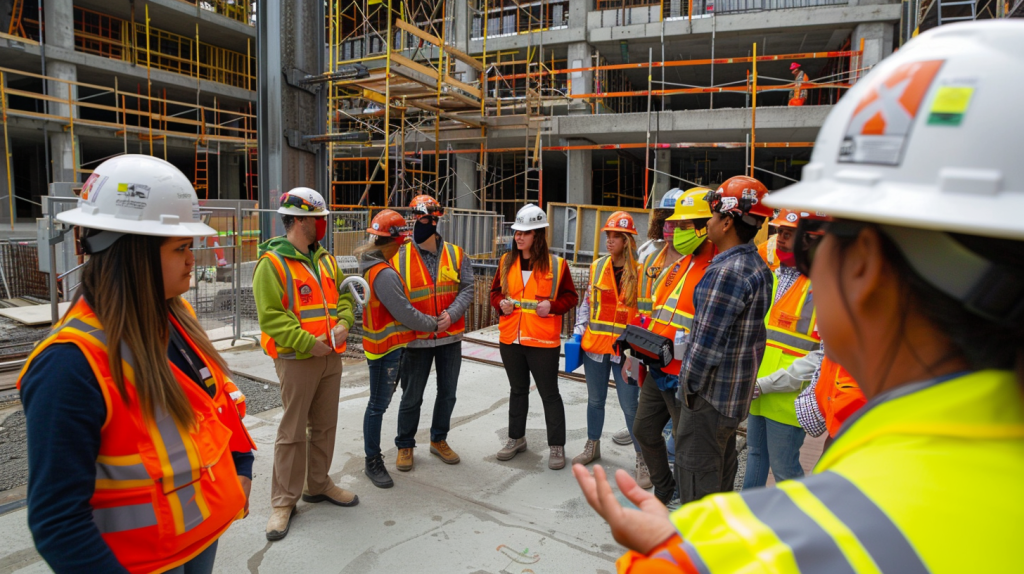How Can Advanced Solutions from StruxHub Transform Quality Control in Construction?
Table of Contents:

Explore the transformative impact of StruxHub’s advanced quality control solutions in construction. Understand the significance of automated inspections, real-time monitoring, and comprehensive reporting in achieving top-tier project quality.
Quality control in construction is more than just meeting standards—it’s about exceeding expectations and delivering exceptional project outcomes. With the right tools and strategies, quality control can be streamlined and elevated to new heights. Advanced solutions from StruxHub offer a comprehensive approach to quality management, ensuring that every project meets the highest standards.
This guide delves into the advanced quality control solutions provided by StruxHub and how they can revolutionize your construction projects. From automated inspections to real-time monitoring and detailed reporting, these tools are designed to enhance efficiency, accuracy, and overall project quality.
The Impact of Advanced Quality Control Solutions
Elevating Project Standards
Meeting and Exceeding Expectations
Advanced quality control solutions from StruxHub help elevate project standards by ensuring consistent adherence to quality requirements and industry regulations. These tools provide a structured approach to quality management, making it easier to maintain high standards across all project phases.
For example, automated inspection checklists ensure that all critical aspects of the project are reviewed consistently, reducing the risk of oversight. This systematic approach helps in delivering projects that not only meet but exceed client expectations.
Reducing Rework and Costs
Enhancing Efficiency
Effective quality control reduces the need for rework, which can be costly and time-consuming. StruxHub’s solutions provide real-time monitoring and immediate feedback, allowing for quick identification and correction of issues.
For instance, real-time data analytics can pinpoint potential quality issues before they become significant problems, enabling proactive management. This capability helps keep projects on schedule and within budget by minimizing delays and additional costs associated with rework.
Strengthening Client Trust
Building Long-Term Relationships
Consistently delivering high-quality projects helps build trust and strengthen relationships with clients. StruxHub’s quality control solutions ensure transparency and accountability, key factors in gaining and maintaining client trust.
For example, comprehensive reporting tools allow for detailed documentation of quality control processes and outcomes. Sharing these reports with clients demonstrates your commitment to quality and can enhance your reputation as a reliable construction partner.

Key Features of StruxHub’s Quality Control Solutions
Automated Inspection Tools
Streamlining Quality Checks
StruxHub’s automated inspection tools simplify the process of conducting quality checks by providing digital checklists and automated data collection. These tools ensure that inspections are thorough and consistent.
For example, using a tablet or mobile device, inspectors can access and complete digital checklists on-site, capturing real-time data and images. This approach reduces the risk of human error and ensures that all necessary checks are performed accurately.
Real-Time Monitoring Systems
Enhancing Oversight
Real-time monitoring systems offered by StruxHub provide continuous oversight of construction activities. These systems enable project managers to track quality metrics and identify issues as they arise.
For instance, sensors and IoT devices can be deployed across the construction site to monitor various parameters such as structural integrity, environmental conditions, and material quality. This real-time data helps in making informed decisions quickly, ensuring that quality standards are maintained throughout the project.
Comprehensive Reporting Capabilities
Detailed Documentation
StruxHub’s quality control solutions include robust reporting capabilities that provide detailed documentation of all quality control activities. These reports are essential for tracking progress, identifying trends, and ensuring compliance.
For example, automated reports can be generated to summarize inspection results, corrective actions taken, and overall project quality metrics. These reports can be shared with stakeholders to provide transparency and demonstrate adherence to quality standards.
Mobile Accessibility
Flexibility for On-Site Management
Mobile accessibility is a crucial feature of StruxHub’s quality control solutions, allowing construction managers to perform quality checks and access data from anywhere. This flexibility enhances the efficiency and effectiveness of quality control processes.
For instance, mobile apps enable inspectors to document issues on the spot, upload photos, and update records in real-time. This immediacy ensures that any quality concerns are addressed promptly, reducing the risk of project delays.
Related Articles for Construction Superintendents:
Top 10 Best Practices for Superintendents in Construction Project Management Software
Top 7 Roles of Superintendents in Navigating the Digital Transformation of Construction
10 Best Ways Superintendents Maximize Efficiency with Digital Construction Management Tools
Strategies for Implementing Advanced Quality Control

StruxHub
Experience the power of StruxHub today and witness firsthand how it can revolutionize your construction operations.
Developing a Quality Management Plan
Structured Approach
A well-defined quality management plan is essential for implementing advanced quality control. This plan should outline quality objectives, standards, and procedures, ensuring a structured approach to quality management.
For example, a quality management plan might include specific quality benchmarks, detailed inspection protocols, and guidelines for corrective actions. By providing a clear framework, the plan ensures that all team members understand their roles in maintaining quality.
Training and Empowering Teams
Building Expertise
Effective quality control requires a skilled and knowledgeable workforce. Providing training on quality control tools and techniques is crucial for empowering your team to uphold high standards.
For instance, regular training sessions on using StruxHub’s quality control solutions can help team members become proficient in utilizing these tools. Empowering your team with the right skills ensures that quality control processes are executed effectively.
Conducting Regular Quality Audits
Continuous Improvement
Regular quality audits are vital for continuous improvement in construction projects. These audits help identify areas for improvement and ensure that quality control measures are effective.
For example, conducting quarterly audits to review inspection results, corrective actions, and overall quality metrics can provide valuable insights. These audits enable construction managers to refine their quality control processes and enhance project outcomes.
Fostering a Culture of Quality
Commitment to Excellence
Fostering a culture of quality within your organization ensures that quality control is a priority for everyone involved in the project. This commitment to excellence drives continuous improvement and superior project outcomes.
For example, recognizing and rewarding team members who demonstrate a strong commitment to quality can reinforce the importance of maintaining high standards. Creating a culture that values quality helps ensure that it is consistently prioritized in every aspect of the project.
Related Articles:
Best Guide to Construction Management Software
The Best Guide to Delivery Management Systems (DMS) for Commercial Construction
Practical Applications of StruxHub’s Quality Control Solutions
Enhancing Project Quality with Real-Time Monitoring
StruxHub’s real-time monitoring systems have been instrumental in enhancing project quality by providing continuous oversight and immediate feedback. These systems enable construction managers to track quality metrics and address issues promptly.
Streamlining Inspections with Automated Tools
Using automated inspection tools from StruxHub simplifies the process of conducting quality checks. These tools ensure that inspections are thorough and consistent, reducing the risk of errors and oversights.
Improving Documentation with Comprehensive Reporting
StruxHub’s robust reporting capabilities provide detailed documentation of all quality control activities. These reports are essential for tracking progress, ensuring compliance, and demonstrating transparency to stakeholders.
Increasing Flexibility with Mobile Accessibility
The mobile accessibility of StruxHub’s quality control solutions allows construction managers to perform quality checks and access data from anywhere. This flexibility enhances the efficiency and effectiveness of quality control processes.
Top 12 Tips for Mastering Quality Control in Construction

1. Develop a Detailed Quality Management Plan
Create a comprehensive quality management plan that outlines quality objectives, standards, and procedures. Ensure that this plan is communicated to all team members and stakeholders.
2. Utilize Automated Inspection Tools
Implement automated inspection tools to streamline quality checks. These tools ensure that inspections are thorough and consistent, reducing the risk of errors.
3. Leverage Real-Time Monitoring
Use real-time monitoring systems to track quality metrics continuously. This oversight enables prompt identification and correction of any issues.
4. Ensure Comprehensive Reporting
Utilize robust reporting capabilities to document all quality control activities. Detailed reports are essential for tracking progress and demonstrating compliance.
5. Provide Ongoing Training
Offer regular training sessions on quality control tools and techniques. Empowering your team with the right skills ensures effective execution of quality control processes.
6. Conduct Regular Quality Audits
Schedule regular quality audits to review inspection results, corrective actions, and overall quality metrics. Use these audits to identify areas for improvement.
7. Foster a Culture of Quality
Create a culture that values quality and prioritizes excellence. Recognize and reward team members who demonstrate a strong commitment to quality.
8. Use Mobile Inspection Apps
Enhance flexibility and accessibility by using mobile inspection apps. These apps allow inspectors to document issues and update records in real-time.
9. Standardize Inspection Checklists
Develop standardized inspection checklists to ensure consistency in quality checks. These checklists help ensure that all critical aspects of the project are reviewed.
10. Monitor Quality Metrics
Track key quality metrics to identify trends and areas for improvement. Use this data to refine your quality control processes continuously.
11. Implement Corrective Actions Quickly
Address any quality issues promptly by implementing corrective actions. Ensure that these actions are documented and monitored for effectiveness.
12. Communicate Clearly and Often
Maintain clear and transparent communication with all stakeholders about quality control. Ensure that everyone understands the procedures and agrees on the best course of action.
Related Articles:
Enhancing Construction Project Safety with Advanced Risk Management Solutions
Top Strategies and Cutting-Edge Tools for Mastering Construction Document Management
Top 12 Ways Digital Project Management is Transforming the Commercial Construction Landscape.
Achieving Excellence in Quality Control with StruxHub
Mastering quality control in construction is essential for delivering projects that meet the highest standards. By implementing advanced quality control solutions from StruxHub, construction managers can enhance efficiency, accuracy, and overall project quality. From automated inspections to real-time monitoring and comprehensive reporting, these tools provide the foundation for superior project outcomes. Embrace these strategies and tools to ensure that your projects consistently meet and exceed client expectations.
StruxHub enhances efficiency and coordination across all project phases, providing a single source of truth that eliminates silos and fosters collaboration. Real-time updates, financial management tools, and seamless commvunication features ensure that all team members and stakeholders are aligned and informed, reducing the risk of errors and delays. With comprehensive solutions for document management, risk mitigation, and quality control, StruxHub maintains project integrity and safety, while mobile access and integration capabilities further enhance project flexibility and efficiency.
StruxHub’s Key Features and Benefits:
- Advanced Delivery Management: Automate and optimize your delivery schedules, ensuring materials arrive just in time, every time.
- Site Communication: Utilize georeferenced maps and instant messaging to keep every team member informed and aligned.
- Construction Materials Management: Track inventory levels and manage materials procurement with ease, reducing waste and avoiding project delays.
- Construction Safety & Inspection Workflows: Implement customizable mobile forms for conducting safety inspections and managing compliance documentation effortlessly.
- Short-Term Scheduling: Visualize project tasks with detailed floor plans, linking each activity to specific locations for better planning accuracy.
- Construction Resource Management: Efficiently allocate personnel and equipment, maximizing productivity and reducing idle time.
StruxHub’s Product Offering:
- StruxHub Deliveries: Simplifies the coordination of incoming deliveries, ensuring materials and equipment are precisely timed to project needs.
- StruxHub Logistics: Offers intelligent site logistics planning, from crane scheduling to space allocation, for smoother operations.
- StruxHub Safety: Elevates on-site safety standards with easy-to-use tools for inspections, permits, and incident reporting.
- StruxHub Scheduling: Enhances project timelines with intuitive scheduling tools that ensure tasks are completed efficiently and on time.
With StruxHub, construction companies can look forward to a streamlined, more efficient project execution that delivers on time and within budget. Embrace the power of innovation and take your construction projects to the next level.
Don’t miss out on the opportunity to optimize your construction management processes with StruxHub. Sign up for a free demo today. Let’s build smarter, together.
FAQ
1. How do advanced quality control solutions improve construction project outcomes?
Advanced quality control solutions improve construction project outcomes by providing accurate, real-time data on construction activities, enabling early identification of quality issues, and ensuring compliance with standards. These tools help construction managers monitor quality continuously and implement corrective actions promptly.
For instance, StruxHub’s quality control software automates the process of recording inspection results, generating reports, and tracking corrective actions. This automation ensures that quality control data is accurate and actionable, helping project managers maintain high-quality standards throughout the project.
2. What are the key features of StruxHub’s advanced quality control solutions?
StruxHub’s advanced quality control solutions offer several key features that streamline the quality assurance process and enhance overall project management. Some essential features include:
- Automated Inspection Tools: Automated tools simplify conducting quality checks by providing digital checklists and real-time data collection, ensuring thorough and consistent inspections.
- Real-Time Monitoring Systems: Continuous oversight of construction activities through real-time monitoring systems enables project managers to track quality metrics and address issues promptly.
- Comprehensive Reporting Capabilities: Robust reporting tools provide detailed documentation of all quality control activities, essential for tracking progress and ensuring compliance.
- Mobile Accessibility: Mobile apps allow construction managers to perform quality checks and access data from anywhere, enhancing the efficiency and effectiveness of quality control processes.
3. How can construction teams effectively implement advanced quality control solutions?
Construction teams can effectively implement advanced quality control solutions by choosing user-friendly platforms, providing training, integrating with existing systems, and encouraging employee participation. Implementing a robust quality control system enhances project quality and ensures compliance with standards.
First, selecting a user-friendly quality control tool is crucial. The tool should offer features such as automated inspections, real-time monitoring, and detailed reporting, and should be easy for team members to use.
Providing training on how to use the quality control tool ensures that all team members are familiar with the process and understand the importance of maintaining quality standards. Regular training sessions and refreshers can reinforce the correct use of the tool and encourage consistent application of best practices.
Integrating the quality control tool with existing project management and accounting systems ensures that all quality control activities are reflected in the overall project plan and budget. This integration enhances coordination and data consistency, making it easier to track the impact of quality control activities on the project.
Encouraging employee participation in the quality control process fosters a culture of accountability. Educating employees about the importance of quality control and how it benefits the project and the company helps ensure that all team members take quality control seriously.
4. What best practices should construction teams follow to manage quality control effectively?
To manage quality control effectively, construction teams should follow these best practices:
- Develop a Comprehensive Quality Management Plan: Create a detailed quality management plan that outlines quality objectives, standards, and procedures. Ensure that this plan is communicated to all team members and stakeholders.
- Utilize Automated Inspection Tools: Implement automated inspection tools to streamline quality checks. These tools ensure that inspections are thorough and consistent, reducing the risk of errors.
- Leverage Real-Time Monitoring Systems: Use real-time monitoring systems to track quality metrics continuously. This oversight enables prompt identification and correction of any issues.
- Ensure Comprehensive Reporting: Utilize robust reporting capabilities to document all quality control activities. Detailed reports are essential for tracking progress and demonstrating compliance.
- Provide Ongoing Training: Offer regular training sessions on quality control tools and techniques. Empowering your team with the right skills ensures effective execution of quality control processes.
- Conduct Regular Quality Audits: Schedule regular quality audits to review inspection results, corrective actions, and overall quality metrics. Use these audits to identify areas for improvement.
- Foster a Culture of Quality: Create a culture that values quality and prioritizes excellence. Recognize and reward team members who demonstrate a strong commitment to quality.
- Use Mobile Inspection Apps: Enhance flexibility and accessibility by using mobile inspection apps. These apps allow inspectors to document issues and update records in real-time.
- Standardize Inspection Checklists: Develop standardized inspection checklists to ensure consistency in quality checks. These checklists help ensure that all critical aspects of the project are reviewed.
- Monitor Quality Metrics: Track key quality metrics to identify trends and areas for improvement. Use this data to refine your quality control processes continuously.
- Implement Corrective Actions Quickly: Address any quality issues promptly by implementing corrective actions. Ensure that these actions are documented and monitored for effectiveness.
- Communicate Clearly and Often: Maintain clear and transparent communication with all stakeholders about quality control. Ensure that everyone understands the procedures and agrees on the best course of action.




